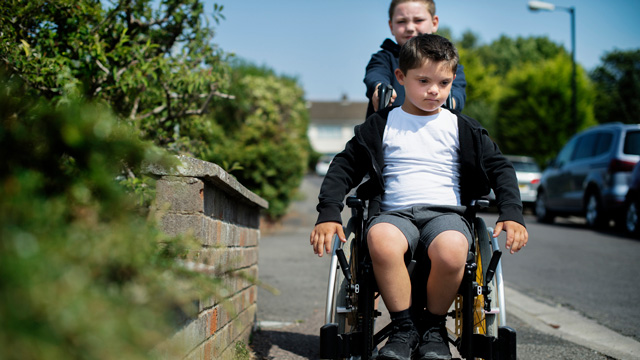“Live by the Golden Rule… but also know there’s more to it”
What exactly does it take to raise a compassionate, empathetic, and open-minded boy? According to experts, the key is open, honest, and frequent communication—starting when boys are young. We came up with 10 easy yet important messages for raising a son with compassion.
1. It’s more than OK to show and share your emotions.
Boys traditionally haven’t been encouraged to express themselves emotionally. Instead, they are applauded for their prowess in physical pursuits like sports. Despite social progress that has definitively proven otherwise, “boys don’t cry” and “man up” remain common-if-outdated sentiments among even the most well-meaning parents. “Boys can have battles and want to jump off of things and light things on fire, and still be emotionally complex and need to be held when they are upset,” says Rosalind Wiseman, a parenting educator and author of Masterminds and Wingmen. Let your boy cry, hug him and tell him that you support him, always.
2. Don’t sweat the small stuff.
According to Dr. Mary L. Gavin, what kids worry about is often related to the age and stage they’re in. For boys, particularly tween-aged and teenaged ones, anxiety about their changing bodies and changing social dynamics can easily and quickly spiral out of control. Encourage your boy to focus on what’s genuinely important—like having a solid foundation of knowing what’s right and what’s wrong—and to let go of the trivial stuff.
3. Live by the Golden Rule… but also know there’s more to it.
Beyond teaching the Golden Rule, which is to treat others as you’d want to be treated, impress upon your boy that while respect is a two-way street, tolerance, and acceptance are just as important. According to Dana Williams, parenting columnist at Teaching Tolerance, the Golden Rule alone is insufficient. “There are times when we as parents must explain things that are painful and unfair—racism, sexism, stereotypes, hate. Times when we must comfort our children, times I have had to help my eight-year-old son learn that what some would do unto him isn’t always kind or fair.” Teach boys that mutual respect is just a start toward open-hearted acceptance.
4. Learn to walk in others’ shoes.
An essential life skill that parents should teach children is empathy. “It sounds a lot like ‘sympathy,’ but empathy is quite different,” says business and life coach Justine Campbell of Mindquest Group. “Empathy is about feeling with other people. It’s the ability to understand and experience another’s feelings, and to respond in ways that help, not hinder.” Research shows that while the ability to understand others’ perspectives begins rising steadily in girls starting from age 13, it doesn’t really begin for boys until age 15. Empathy is like a muscle that needs to be flexed over time to gain power.
5. Know that kindness is one of your greatest strengths.
Speaking of muscles: perhaps the greatest muscle everyone needs to use more is kindness. Encouraging boys to practice kindness will help to habituate them to know how to give and receive kindness, which will reap benefits in current and future relationships. Science has proven that kindness and generosity are the two driving forces that lead to successful, long-term relationships. Remind your boy that the more he uses his kindness muscle, the stronger it’ll get.
Related: 20 Empowering Things to Say to Your Daughter Every Day

6. Celebrate those who are different from you.
If empathy and tolerance are foundational skills required for nurturing a boy to become a nurturing, caring man, teaching him to celebrate differences in others will empower him to recognize and love the differences in himself. Scholastic has a useful lesson plan and reading list for learning about differences that can help foster a greater understanding for both young and old people alike.
7. Share what you have generously and willingly.
Generosity is an infectious condition. According to Nancy Eisenberg, a researcher who specializes in children’s social development, children become more generous by having the experience of giving to others—and learning how good that feels. But there’s a catch: Eisenberg cautions that the giving experience needs to be voluntary. “If we force children to share, they walk away resentful, not feeling generous. Not surprisingly, they’re less likely to share after that.”
8. Recognize and embrace your own strengths and ideas—don’t always go with the flow.
Few people would argue that callous behavior is somehow innate. If anything, bad attitudes and jerkiness tend to be learned over time—and either tamped down or reinforced by our social circles. Studies have shown that rudeness can be as contagious as the common cold; thus, it’s important to teach boys that they have control and ownership of their behavior and ideas, even if the crowd does and believes something different.
9. Know when to say “I’m sorry.”
For many people, especially men, the two hardest words to say are “I’m sorry.” Girls and women often are conditioned to apologize, whether or not an apology is warranted. Teaching boys the power of saying “I’m sorry” will instill self-awareness and humility, and give them a head start in understanding that taking personal responsibility is a quality that will serve them well into their adulthood.
10. Be yourself.
Whether you’re raising a son who is a star athlete who likes to wear black nail polish or a math whiz who likes to watch Broadway musicals, letting your kid know that he is perfect exactly the way he is will empower him to love himself, no matter what external cultural and social forces and messages may be put upon him. Reinforcing the truth that there isn’t a single way to “be a man” will help to create a new generation of boys who’ll change the world for the better.
Related: 9 ‘Harmless’ Phrases That Hurt Kids More Than You Think











